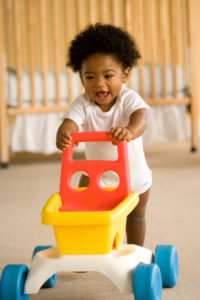
Last month I was lucky enough to spend a whole week with my 16-month-old niece. Besides taking credit for teaching Mallory the words “Di-Di” (a variation of my name that I pushed HARD) and “yes” (you can thank me later), I loved seeing how much she had grown since the winter. Mallory had become much more mobile since I last saw her and was eager to show me how much she could do on her own. For much of one afternoon, Mallory buoyantly pushed her shiny “Frozen” car from one side of the house to the other. She was unstoppable—until she hit a literal and then figurative wall.
With the car wedged against the door, Mallory looked up at me with hope in her eyes and gestured for me to turn the car around. Instead, I sat next to her and said, “this is so hard, isn’t it? It seems that the car is stuck.” And then I encouraged her to try to move the car. My little niece looked annoyed (at the car, the wall and definitely me). My response didn’t change and Mallory’s frustration became re-purposed into energy to experiment with different angles between the animate and inanimate object. I saw the pure joy in her eyes when she realized the car could move backward and she could continue driving without any physical help from me.
I was very tempted to relieve Mallory of her temporary distress and turn the car around myself. However, as a therapist, I know how important it is for everybody, even toddlers, to learn to tolerate distress and soothe themselves when they feel sad or frustrated. Many people who enter therapy as a teenager or young adult struggle to do so independently and (sometimes unwittingly) come to therapy to develop these emotional muscles. There are many theories on parenting and how to nurture children from birth to college (and beyond) and those choices are personal decisions that all parents make for themselves. However, from a therapeutic standpoint, allowing your child to experience small frustration can be a positive growth experience. Here are a few things to keep in mind:
- It is ok to be frustrated. Toddlers and little children are learning new skills every day. It won’t all come easily and this would discourage anyone at any age. When a child falls down trying to walk independently, she will inevitably be upset and cry out. She might feel sad, frustrated or angry. These feelings will pass and when a child is able to stand back up and try again, she begins to learn these feelings don’t last forever.
- Learning to tolerate emotions is just as important as learning how to crawl, walk or talk! Emotions are new and can feel overwhelming to children. When a child doesn’t get a new skill right away, she will unsurprisingly get upset just like my niece. When that child tries again, she has grown emotionally. She has learned that she can have negative emotions and that she can tolerate the distress they caused. Negative emotions are a part of life. A child who gets the opportunity to practice emotional skills at a young age is well on her way to knowing she can handle bigger more frustrating events as she gets older, such as, not getting an A on a math test or getting the chorus instead of the lead in a school play.
- If your child seems to be in real distress, be there for her. Exploration is fun and teaches problem-solving. But knowing that you are there if she really struggles enforces the message to your child that she is safe and you can support her if she hit a literal or proverbial wall.


















